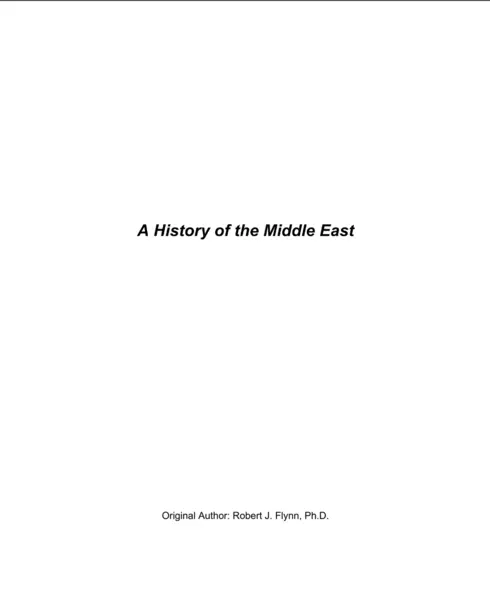
A History of the Middle East - 1.1
![]()
![]()
![]()
![]()
![]()
Robert J. Flynn, Portland Community College
Copyright Year:
Publisher: Portland Community College
Language: English
Formats Available
Conditions of Use
![]() Attribution-NonCommercial-ShareAlike
Attribution-NonCommercial-ShareAlike
CC BY-NC-SA
Reviews
Reviewed by Lindsay Benstead, Professor of Politics & Global Affairs, Portland State University on 8/18/23
This textbook provides a comprehensive overview of Middle East history, beginning with the age of the Prophet and ending with the immediate post-9-11 period. It is refreshing to see coverage of North Africa, which is often under-emphasized in... read more
![]()
![]()
![]()
![]()
![]()
Reviewed by Lindsay Benstead, Professor of Politics & Global Affairs, Portland State University on 8/18/23
Comprehensiveness
This textbook provides a comprehensive overview of Middle East history, beginning with the age of the Prophet and ending with the immediate post-9-11 period. It is refreshing to see coverage of North Africa, which is often under-emphasized in textbooks on the Middle East (MENA) region.
Content Accuracy
The textbook is unbiased and accurate. Several canonical works from Middle East history are cited by the author.
Relevance/Longevity
Since the focus of the textbook is on history, it will remain relevant for some time to come. While it is true that the discussion ends with the early 2000s, this is not a concern for a history textbook.
Clarity
The book is written with clear language that will be understandable to undergraduates.
Consistency
The textbook is written in a highly consistent manner across the chapters, in part because it has a single author. However, it is dense and will likely benefit from complementary lectures, discussions, films, and other resources.
Modularity
The chapters are clearly titled making it easy for faculty to assign single chapters within different courses, depending on the specific topics and time periods under study.
Organization/Structure/Flow
The chapters are organized chronologically, making the textbook easy to follow.
Interface
The interface does not include internal links, but it is possible to navigate using Control F without problems. There are no URLs which could go stale.
Grammatical Errors
The book is free from grammatical errors.
Cultural Relevance
The book covers sensitive topics. It does so in an unbiased manner and draws on scholars from different perspectives and backgrounds.
Table of Contents
- Preface
- Chapter One: Introduction
- Chapter Two: Muhammad and Islam, c. 570-632
- Chapter Three: The Arab Conquest and the Establishment of the Caliphate, 632-809
- Chapter Four: Religious, Social, and Intellectual Changes, 632-1258
- Chapter Five: The Decline of the Arab Empire, 809-1300
- Chapter Six: The Gunpowder Empires, 1300-1566
- Chapter Seven: Ottoman Crisis and Adaptation, 1566-1768
- Chapter Eight: Western Intrusions, Eastern Responses, 1768-1878
- Chapter Nine: The Twilight of the Ottoman Empire, 1878-1916
- Chapter Ten: “A Peace to End All Peace", 1916-1922
- Chapter Eleven: The Independent States, 1923-1948
- Chapter Twelve: The Middle East Under European Control, 1923-1948
- Chapter Thirteen, The Establishment of Israel, 1918-1948
- Chapter Fourteen: The Age of Nasser, 1949-1967
- Chapter Fifteen: Arabia, Turkey, and Iran, 1949-1979
- Chapter Sixteen: The Middle East After Nasser, 1967-1979
- Chapter Seventeen: Transition and Stalemate, 1980-1990
- Chapter Eighteen: The Gulf War and Its Legacy, 1990-2001
About the Book
The History of the Middle East is a single volume account of the region’s development from the time of Muhammad to the eve of the 2001 al-Qaeda attacks. It is
intended to serve as the main textbook for a single semester or term class and is designed to be accessible to students who do not possess prior knowledge of the region or its history. It offers a relatively concise narrative of the region’s historical development that seeks to avoid oversimplification on the one hand and overcomplexity on the other.
About the Contributors
Author
Robert Flynn received his PhD in diplomatic history from the University of Kentucky in 2001 where he studied with George Herring. He has been an instructor of history at Portland Community College since 2004 and teaches Middle East history, Western Civilization, and US History. He is presently serving as the PCC History Subject Area Committee chair.
